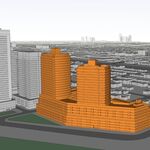M II A II R II K
Senior Member
How bad driving habits are causing GTA traffic gridlock
September 02, 2012
By San Grewal

Read More: http://www.thestar.com/news/gta/art...iving-habits-are-causing-gta-traffic-gridlock
.....
“We need to create a culture of disciplined driving,†says Professor Baher Abdulhai, director of the Intelligent Transportation Systems Centre at the University of Toronto. The economic cost of congestion in the GTA is pegged at upwards of $6 billion a year. And there is also the cost of lost family time and inactivity. Road pricing and public transit are seen as ways to fix things. But could simply improving our driving habits make a difference?
- Abdulhai says GTA drivers need to know that refusing to let drivers merge, rubbernecking, speeding into already congested areas and driving the wrong speed in a lane need to be viewed as much more than just bad driving. “Driving behaviour has an impact on traffic congestion. It makes everything worse. It’s not the silver bullet to fix traffic congestion, but if you combine the right systems with disciplined driving, a 25 to 30 per cent reduction in congestion is possible.â€
- That’s the target traffic experts such as Abdulhai are trying to achieve: when traffic volume through a typical stretch of highway hits maximum capacity (about 2,200 vehicles per hour per lane), flow drops to zero, resulting in complete gridlock. It takes a significant reduction in traffic to get things moving again, he explains. Without such a reduction, gridlock will continue to cost the GTA. According to a 2010 study for the Toronto Board of Trade, the average GTA commute was 80 minutes, the worst in North America, and according to study done for Metrolinx, traffic congestion will cost the GTA and Hamilton area economy $15 billion by 2031.
- When approaching a known congestion zone such as an accident or construction area, drivers often accelerate before braking hard once they are very near the stopped car ahead. But research shows that this approach speeds up the amount of time it takes all cars to reach stopped traffic by pushing the so-called line of zero movement further away from the congestion cause. In other words cars are forced to stop sooner and for longer. It then takes much longer for all traffic to begin moving again. A smooth traffic flow keeps the line of zero movement to a smaller area, trapping fewer vehicles.
- Abdulhai says bad driving habits, such as tailgating, which causes sharp braking and a domino effect that leads to stop-and-go traffic, should be addressed through education. But he stresses that better traffic systems, such as metered lights at on-ramps, congestion pricing and proper speed limits also need to be implemented. In Germany, the driver’s test is so difficult (requiring months of preparation) that the U.S. army recently complained to German authorities about the failure rate of its members and their spouses who are based there but cannot drive. Abdulhai says congestion and bad driving in the GTA will only get worse if the entire traffic culture doesn’t change.
.....

September 02, 2012
By San Grewal

Read More: http://www.thestar.com/news/gta/art...iving-habits-are-causing-gta-traffic-gridlock
.....
“We need to create a culture of disciplined driving,†says Professor Baher Abdulhai, director of the Intelligent Transportation Systems Centre at the University of Toronto. The economic cost of congestion in the GTA is pegged at upwards of $6 billion a year. And there is also the cost of lost family time and inactivity. Road pricing and public transit are seen as ways to fix things. But could simply improving our driving habits make a difference?
- Abdulhai says GTA drivers need to know that refusing to let drivers merge, rubbernecking, speeding into already congested areas and driving the wrong speed in a lane need to be viewed as much more than just bad driving. “Driving behaviour has an impact on traffic congestion. It makes everything worse. It’s not the silver bullet to fix traffic congestion, but if you combine the right systems with disciplined driving, a 25 to 30 per cent reduction in congestion is possible.â€
- That’s the target traffic experts such as Abdulhai are trying to achieve: when traffic volume through a typical stretch of highway hits maximum capacity (about 2,200 vehicles per hour per lane), flow drops to zero, resulting in complete gridlock. It takes a significant reduction in traffic to get things moving again, he explains. Without such a reduction, gridlock will continue to cost the GTA. According to a 2010 study for the Toronto Board of Trade, the average GTA commute was 80 minutes, the worst in North America, and according to study done for Metrolinx, traffic congestion will cost the GTA and Hamilton area economy $15 billion by 2031.
- When approaching a known congestion zone such as an accident or construction area, drivers often accelerate before braking hard once they are very near the stopped car ahead. But research shows that this approach speeds up the amount of time it takes all cars to reach stopped traffic by pushing the so-called line of zero movement further away from the congestion cause. In other words cars are forced to stop sooner and for longer. It then takes much longer for all traffic to begin moving again. A smooth traffic flow keeps the line of zero movement to a smaller area, trapping fewer vehicles.
- Abdulhai says bad driving habits, such as tailgating, which causes sharp braking and a domino effect that leads to stop-and-go traffic, should be addressed through education. But he stresses that better traffic systems, such as metered lights at on-ramps, congestion pricing and proper speed limits also need to be implemented. In Germany, the driver’s test is so difficult (requiring months of preparation) that the U.S. army recently complained to German authorities about the failure rate of its members and their spouses who are based there but cannot drive. Abdulhai says congestion and bad driving in the GTA will only get worse if the entire traffic culture doesn’t change.
.....





